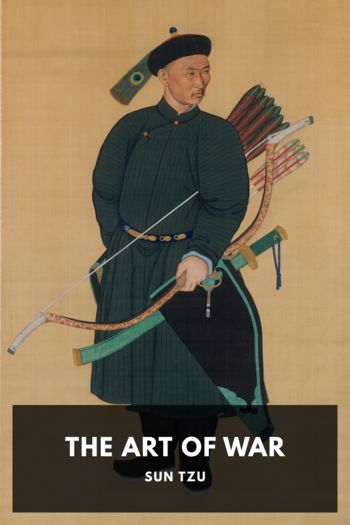The Art of War by Sun Tzu (elon musk reading list TXT) 📕

- Author: Sun Tzu
Book online «The Art of War by Sun Tzu (elon musk reading list TXT) 📕». Author Sun Tzu
傳 is Li Chʽüan’s conjecture for 待, which is found in the Tʽung Tien and the Yü Lan. The Tʽu Shu, unsupported by any good authority, adds 間也 after 敵. In that case, the doomed spies would be those of the enemy, to whom our own spies had conveyed false information. But this is unnecessarily complicated. Tu Yu gives the best exposition of the meaning: “We ostentatiously do things calculated to deceive our own spies, who must be led to believe that they have been unwittingly disclosed. Then, when spies are captured in the enemy’s lines, they will make an entirely false report, and the enemy will take measures accordingly, only to find that we do something quite different. The spies will thereupon be put to death.” Capt. Calthrop makes a hopeless muddle of the sentence. As an example of doomed spies, Ho Shih mentions the prisoners released by Pan Chʽao in his campaign against Yarkand. (See note 629) He also refers to 唐儉 Tʽang Chien, who in 630 AD was sent by Tʽai Tsung to lull the Turkish Khan 頡利 Chieh-li into fancied security, until Li Ching was able to deliver a crushing blow against him. Chang Yü says that the Turks revenged themselves by killing Tʽang Chien, but this is a mistake, for we read in both the Old and the New Tʽang History (ch. 58, fol. 2 and ch. 89, fol. 8 respectively) that he escaped and lived on until 656. 酈食其 Li I-chi792 played a somewhat similar part in 203 BC, when sent by the King of Han to open peaceful negotiations with Chʽi. He has certainly more claim to be described as a 死間; for the King of Chʽi, being subsequently attacked without warning by Han Hsin, and infuriated by what he considered the treachery of Li I-chi, ordered the unfortunate envoy to be boiled alive. ↩
This is the ordinary class of spies, properly so called, forming a regular part of the army. Tu Mu says: 生間者必取內明外愚形劣心壯趫健勁勇閑於鄙事能忍饑寒垢耻者為之 “Your surviving spy must be a man of keen intellect, though in outward appearance a fool; of shabby exterior, but with a will of iron. He must be active, robust, endowed with physical strength and courage; thoroughly accustomed to all sorts of dirty work, able to endure hunger and cold, and to put up with shame and ignominy.” Ho Shih tells the following story of 達奚武 Ta-hsi Wu of the Sui dynasty: “When he was governor of Eastern Chʽin, 神武 Shên-wu of Chʽi made a hostile movement upon 沙苑 Sha-yüan. The Emperor Tʽai Tsu [? Kao Tsu] sent Ta-hsi Wu to spy upon the enemy. He was accompanied by two other men. All three were on horseback and wore the enemy’s uniform. When it was dark, they dismounted a few hundred feet away from the enemy’s camp and stealthily crept up to listen, until they succeeded in catching the passwords used by the army. Then they got on their horses again and boldly passed through the camp under the guise of night-watchmen (警夜者); and more than once, happening to come across a soldier who was committing some breach of discipline, they actually stopped to give the culprit a sound cudgelling! Thus they managed to return with the fullest possible information about the enemy’s dispositions, and received warm commendation from the Emperor, who in consequence of their report was able to inflict a severe defeat on his adversary.” With the above classification it is interesting to compare the remarks of Frederick the Great:793 “Es giebt vielerley Sorten von Spions: 1. Geringe Leute, welche sich von diesem Handwerk meliren. 2. Doppelte Spions. 3. Spions von Consequenz, und endlich 4. Diejenigen, welche man zu diesem unglücklichen Hankwerk zwinget.” This of course is a bad cross-division. The first class (Bürgersleute, Bauern, Priesters, etc.) corresponds roughly to Sun Tzǔ’s “local spies,” and the third to “inward spies.” Of Doppelte Spions it is broadly stated that they are employed “um dem Feinde falsche Nachrichten aufzubinden.” Thus they would include both converted and doomed spies. Frederick’s last class of spies does not appear in Sun Tzǔ’s list, perhaps because the risk in using them is too great. ↩
The original text and the Tʽu Shu have 事 in place of the first 親. Tu Mu and Mei Yao-chʽên point out that the spy is privileged to enter even the general’s private sleeping-tent. Capt. Calthrop has an inaccurate translation: “In connection with the armies, spies should be treated with the greatest kindness.” ↩
Frederick concludes his chapter on spies with the words: “Zu allem diesem füge ich noch hinzu, dass man in Bezahlung der Spions freygebig, ja verschwenderisch seyn muss.





Comments (0)